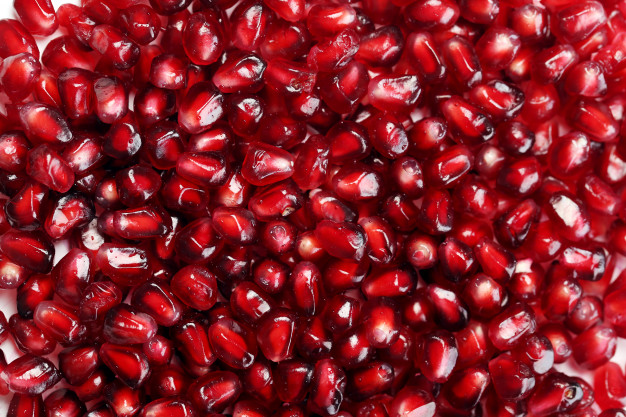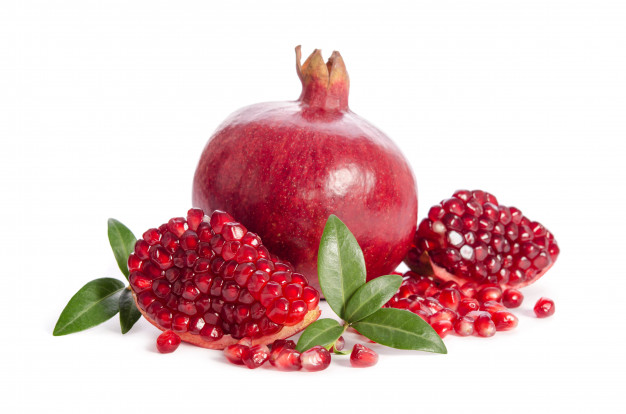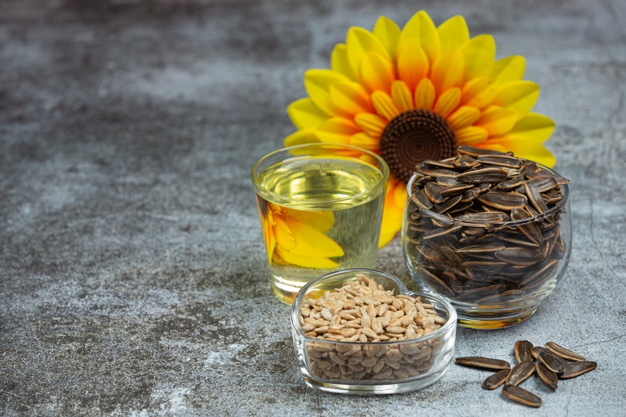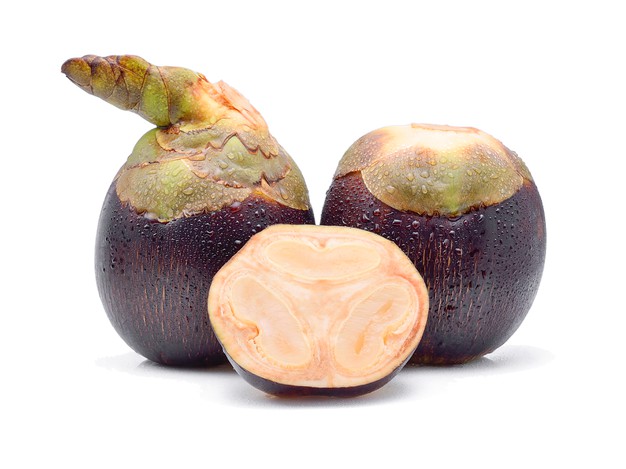Pomegranate is a delicious as well as nutritious fruit that offers numerous health benefits. It contains abundant micronutrients and polyphenolic compounds that help to prevent the susceptibility of developing chronic diseases.
Characteristics
- It is a fruit that contains about 600 seeds and each seed is surrounded by aril (sweet and edible pulp)
- The seeds are basically embedded in a bitter and spongy pulp
- The skin of the pomegranate has a reddish colour
- It is generally sweet in taste but it is fairly tart
Nutritional profile
- It contains desirable amount of carbohydrates and dietary fibre
- It contains fewer amounts of protein as well
- It contains trace amount of saturated as well as unsaturated fat but totally free from cholesterol
- It does not provide enough calories on its oxidation
- It contains numerous micronutrients, which include Vitamin C, Vitamin E, Vitamin K, Vitamin B1, B2, B3, B6, B9, calcium, phosphorus, sodium, potassium, iron and magnesium
- It is packed with various bioactive compounds such as organic acids, anthocyanins, quercetin, luteolin glycosides and kaempferol
Biological property
Antioxidant property
- It contains various polyphenolic compounds like hydrolysable tannin, anthocyanin and ellagic acid derivatives, which are responsible for exerting antioxidant activities
- Punicalagin is another important bioactive component found in pomegranate juice and its peel, shows strong antioxidant activities
- It helps to decrease the concentration of free radicals within body and reduces the prevalence of oxidative stress
- It helps to protect every cells of the body from oxidative damages thus promotes cellular functionality

Anti-inflammatory property
- Punicalagin components of pomegranate are responsible for showing anti-inflammatory activities that help to protect the body from inflammatory damages hence reduces the risk of developing chronic inflammatory diseases
- It is associated with decreasing the concentration of inflammatory mediators within body that helps to prevent inflammation, swelling and pain
Antimicrobial property
- Extract of pomegranate and its peel shows strong antimicrobial activities that help to inhibit microbial growth as well as reproduction within host
- It has seen that it shows antibacterial effect against both gram positive and gram negative bacteria like Escherichia coli and Staphylococcus aureus
- It helps to inhibit the infestation of yeast (Candida albicans) and also reduces its harmful consequences within body
Anti-carcinogenic property
- Consumption of pomegranate especially its juice is extremely effective for reducing the risk of carcinoma as it helps to decrease the concentration of carcinogens within blood
- Its polyphenolic compounds are responsible for preventing gene mutation and also decreases the prevalence of DNA damages
- It helps to suppress the growth of cancerous cell by decreasing proliferation of malignant cells
- It also helps to inhibit the reproduction of cancerous cells by inducing apoptosis
- It helps to prevent metastasis as well
- It is very effective for reducing the prevalence of prostate cancer and breast cancer
- It has seen that consumption of pomegranate juice significantly reduces the level of prostate-specific antigen (PSA) in blood, which is considered as the blood marker of prostate cancer
- It also helps to prevent tumor cell growth


Health benefits
Role on nervous system
- It plays significant role in enhancing the functionality of central as well as peripheral nervous system as it helps to protect every nerve cells from oxidative damages
- Polyphenol components of pomegranate are responsible for boosting up memory
- Consumption of Pomegranate is closely related with inhibiting the prevalence of Alzheimer’s diseases
Role on endurance
- It is better to consume pomegranate juice after strenuous exercise as it helps to prevent muscle soreness that facilitates muscular recovery
- It is associated with decreasing the prevalence of muscle damage by protecting muscles from oxidative damages
- It also helps to enhance muscular strength that helps in improving muscular performance hence improves endurance

Role on skeletal system
- Its consumption is extremely helpful for decreasing the severity of arthritis
- Individual suffer from osteoporosis, osteoarthritis and rheumatoid arthritis should consume pomegranate for reducing pain as well as joint swelling as it exerts potent anti-inflammatory activity that helps to prevent joint tenderness and joint swelling
- It also helps to prevent the damages of cartilage
- Consumption of pomegranate significantly reduces the risk of bone loss
Role on reproductive health
- Pomegranate acts as an effective remedial action for preventing infertility
- It helps to protect the sperm from oxidative damages and improves the functionality of sperm that also facilitates fertilization
- Males who have erectile dysfunction should consume pomegranate
- It also helps to protect the placenta from oxidative damages. Thus helps to facilitate adequate supply of nutrients and oxygen to the fetus that is associated with providing proper nourishment that supports optimum growth and development of fetus and promotes positive outcome of pregnancy
Role on skin
- Consumption of pomegranate juice is extremely effective for replenishing dull and dry skin
- It helps to hydrate the skin effectively
- Antioxidant components of pomegranate is accountable for protecting the skin from oxidative damages and it also helps to prevent aging
- It helps to treat acne as well
- Vitamin C content of pomegranate plays vital role in collagen synthesis, which helps to improve skin elasticity
- It also helps to enhance the texture and brightness of skin

Role on hair
- It is associated with promoting hair growth
- Its antioxidant components are responsible for preventing hair damages
- Micronutrient contents of pomegranate are responsible for improving blood circulation to the scalp that helps in strengthening hair follicle hence promotes the growth of hair follicle
- Its consumption is also very useful for preventing hair falls
Role on digestive health
- Consumption of pomegranate juice is awfully helpful for promoting digestion
- It helps to protect the gastrointestinal tract from inflammatory damages and promotes intestinal functioning
- It helps to decrease the prevalence of ulcerative colitis, Crohn’s disease and inflammatory bowel diseases
Therapeutic advantages
- It is extensively used as an effective preventive measure for cardio vascular diseases
- It is associated with reducing the blood cholesterol concentration hence its consumption is very much useful for preventing fat deposition within blood vessels thus lowers the risk of developing atherosclerosis and ischemic heart diseases
- It also reduces the risk of strokes and heart attacks
- It helps to reduce blood pressure as well

- Its consumption is very effective for promoting hepatic health as it helps to decrease fat deposition in liver cell hence reduces the prevalence of hepatic cell necrosis and fatty liver
- It also helps to reduce the susceptibility of developing gall stones as it significantly reduces blood cholesterol concentration
- Its fibre content plays significant role in preventing obesity. It is considered as a low calorie and low glycemic food hence it can be easily incorporated into the diet of an obes individual
- It helps to decrease insulin resistance thus its consumption is very much effective for preventing diabetes mellitus
General consideration of using Pomegranate
- It can be consumed with green salad and fruit salad
- It can also be consumed with smoothie or juice or cocktail or mocktail
- It can consumed raw as well
- Though it has no side effects but its overconsumption may cause some health hazards like runny nose, swelling, itching, intestinal disturbances and breathing problem. So, it is better to consume pomegranate in recommended amount

Source:
Bassiri-Jahromi, S., 2018. Punica granatum (Pomegranate) activity in health promotion and cancer prevention. Oncology reviews, 12(1).
Caruso, A., Barbarossa, A., Tassone, A., Ceramella, J., Carocci, A., Catalano, A., Basile, G., Fazio, A., Iacopetta, D., Franchini, C. and Sinicropi, M.S., 2020. Pomegranate: nutraceutical with promising benefits on human health. Applied Sciences, 10(19), p.6915.
Danesi, F. and Ferguson, L.R., 2017. Could pomegranate juice help in the control of inflammatory diseases?. Nutrients, 9(9), p.958.
Kandylis, P. and Kokkinomagoulos, E., 2020. Food applications and potential health benefits of pomegranate and its derivatives. Foods, 9(2), p.122.
Panth, N., Manandhar, B. and Paudel, K.R., 2017. Anticancer activity of Punica granatum (pomegranate): a review. Phytotherapy research, 31(4), pp.568-578.
Sahebkar, A., Ferri, C., Giorgini, P., Bo, S., Nachtigal, P. and Grassi, D., 2017. Effects of pomegranate juice on blood pressure: A systematic review and meta-analysis of randomized controlled trials. Pharmacological research, 115, pp.149-161.
Singh, B., Singh, J.P., Kaur, A. and Singh, N., 2018. Phenolic compounds as beneficial phytochemicals in pomegranate (Punica granatum L.) peel: A review. Food chemistry, 261, pp.75-86.
Vučić, V., Grabež, M., Trchounian, A. and Arsić, A., 2019. Composition and potential health benefits of pomegranate: a review. Current pharmaceutical design, 25(16), pp.1817-1827.




